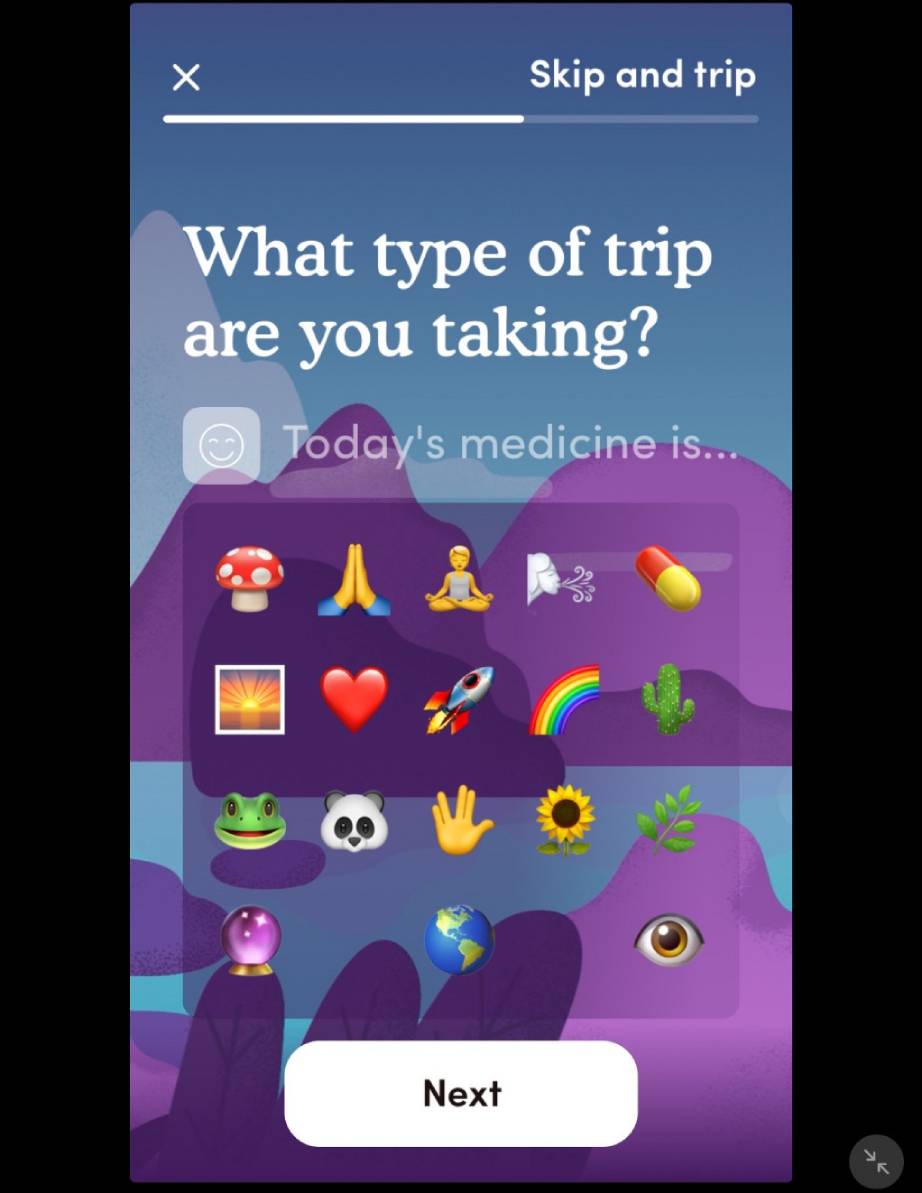
Virtual therapy got a big boost last year from meditation apps like Headspace and Calm, luring the user into a meditative state using words and music. In the midst of a global mental health crisis, it should be no surprise many of us are seeking such digital tonics: A report by GlobalData on mobile health apps estimates a combined total of 90 million users for meditation apps Headspace and Calm as of June 2020.
Headspace and Calm rely strictly on visuals and audio to aid meditation, but some new apps are willing to discuss the use of psychedelics for meditation, changing the mental health discussion and opening new windows of opportunity in healthcare investment. Psychedelics are nowadays shaking off the stigma of the 1960s hippy counterculture, and becoming increasingly regarded as acceptable, legitimate pharmaceuticals which may soon become mainstream options in mental health care.

Discover B2B Marketing That Performs
Combine business intelligence and editorial excellence to reach engaged professionals across 36 leading media platforms.
The caution and taboo around psychedelics is no surprise: Psychedelic substances in use, cultivation or distribution remain mostly illegal around the world. The few major jurisdictions bucking the trend include the Netherlands, where “magic truffles” can be experienced. In the US psilocybin, the psychedelic which naturally occurs in the fungi kingdom, has been decriminalised in the cities of Denver, Oakland, Santa Cruz, Somerville, Washington DC and Cambridge. The US state of Oregon is the first to both decriminalize psilocybin and also legalise it for therapeutic use.
While still in the early stages of medical acceptance, psilocybin may one day join ketamine as a controlled psychedelic substance that is also used as physical and mental medication. In a recent example of the normalising relationship between psychedelics and mental health, Johnson & Johnson’s ketamine-derived nasal spray Spravato was approved by the FDA in 2019 for treatment-resistant depression, showing the increased profile of psychedelics in today’s pharmaceutical industry.
Present state of psychedelics and mental health
One person keeping track of psychedelic acceptance is Sylvia Jablonski. CIO and co-founder of Defiance ETFs, Jablonski is focused on next-gen thematic investment. Psychedelics is one of Defiance’s areas of focus, alongside exchange-traded funds (ETFs) in areas such as 5G and quantum computing.
“Defiance has created the ETF ticker symbol PSY, which is the first US listed psychedelic ETF,” Jablonski tells Verdict. “It gives investors access to companies that operate business models focused on the use of psychedelics and medical cannabis for medicinal and health treatment purposes.”

US Tariffs are shifting - will you react or anticipate?
Don’t let policy changes catch you off guard. Stay proactive with real-time data and expert analysis.
By GlobalDataJablonski sees psychedelics and mental health as dual themes, noting that 30% of depression patients do not respond to current available treatments for mental illnesses such as PTSD.
“(Psychedelics) is an important investment in the future of medicine. Mental illness is on the rise and existing medications have been found wanting.
“You have 700 million people globally affected by mental illness and as many as 200 million-plus never get cured. We hear news of medications that simply do not work, or worse become addictive and habit forming.
“Tenet breakthrough studies and trials in medical use for psychedelics and ketamine have shown notable success in curing or providing improvements to sufferers of anxiety, PTSD, OCD, eating disorders, depression and other related illnesses.”
For Jablonski, the global enlightenment on mental health is leading to a shift in how people see medicines. With cannabis use normalised, it could be the turn of psychedelics to disrupt pharmaceuticals.
“There are loads of startups hitting the market now and seeing billions in investments,” says the CIO. “We believe that if the trials continue to show stellar and compelling results from reputable research organizations like Johns Hopkins, Cornell, MAPS and NYU Medical Center to name a few, that it is possible that we see a future where psychedelics are a treatment option for many mental illness patients.
“This also creates an investment opportunity in these companies that are in it now, producing, storing, distributing and providing services in this space.”
Services include smartphone apps such as Mindleap and Trip, both of which launched last year as rivals to Headspace and Calm. Though without psychedelic visuals, the former lets meditators listen to psychedelic integration meditations and podcasts where experts discuss ketamine and MDMA-assisted psychotherapy.
Trip meanwhile, published by Toronto-based psychedelic therapy company Field Trip, comes with the calming, spaced-out landscapes one expects as visual accompaniment to its narrated meditations. The twist? Before embarking on each journey, the user is asked what type of trip they’re “taking”, a choose-your-panacea affair that gives you a menu of emojis ranging across mushrooms, pills and frogs, something you won’t see on mainstream apps like Calm.

“We have intentionally designed the app as well as the language around it to not encourage the use of any illicit substances, and expect people to respect the terms of service,” says Ronan Levy, executive chairman of Field Trip.
“In some jurisdictions psychedelic molecules are legal and permitted so that is why those options are included for people.”
Positive trips
The legal panacea of choice at Field Trip’s clinics in Canada, the US and the Netherlands is ketamine, where patients can take the psychedelic under therapist supervision and in comfort, both helping to prevent bad experiences. But as Levy explains, Field Trip is more than a clinic chain merely promoting itself with an on-trend app.
“We have two primary operating divisions: Field Trip Health and Field Trip Discovery. Field Trip Discovery is developing next generation psychedelic molecules. Field Trip Health is building the infrastructure for the delivery of psychedelic therapies at scale, primarily using ketamine-assisted therapy (KAP) presently but with a view to using all legalized or approved psychedelic molecules as and when available.
“We have already become, to our knowledge, the largest provider of psychedelic therapies globally.”
The brand’s Trip app meanwhile came about from psilocybin’s decriminalisation in Denver and Oakland in 2019, and how its Field Trip Health services could be “simplified and synthesized into a digital tool that people could follow to maximize the likelihood that they have positive experiences for any form of consciousness expanding activities.
“We recognized that there would be a number of people experimenting with psychedelics and other consciousness-expanding activities without any guidance or support following these decriminalization efforts,” adds Levy, “which creates circumstances in which people could have negative experiences.”

The Clubhouse effect
Patients interested in psychedelics may find a surprising amount of resources out there, and a lot of support for those with mental health issues.
Apart from apps such as Trip there are ones like Lumenate which simulate the psychedelic experience simply by using a smartphone’s flashlight, giving the curious user a taster before committing to anything in real life.
There’s also the rise of audio-based apps full of chatrooms where users and therapists share experiences and tips. The giant in this realm, Clubhouse, has many groups centred around psychedelics and mental health.
Tuning in, the listener can hear conversations about how virtual reality can offer psychedelic tasters to newbies, or the importance of a supportive “container” framework to allay bad trips while dosing. One can also find muted Clubhouse rooms where music plays as soundtrack to participants’ silent trips. There’s even a support group called Mormons on Mushrooms.
The importance of voice during something as visual as a psychedelic trip can’t be overstated, whether it belongs to a therapist, a nearby friend or a guide on your smart device. The current sea change in psychedelics and mental health is a unique 21st century phenomenon, mixing audio, apps and podcasts into one unique blend.
For Jablonski, the “beauty” of social media, meditation apps and psychedelic podcasts is that they have “really morphed into meeting places where people can learn, share and digest information.”
“Having those avenues to get the word out about studies and companies helps to bring attention to what feels like a very good change in the way mental illnesses are managed.”
“The number of companies focussed on psychedelics has grown from the original four (Compass, Atai, Field Trip and MindMed, all of whom are now on NASDAQ) to 50+ or more by some estimates,” adds Levy. “Culturally, psychedelics have gone mainstream. They are being discussed in all forms of media, with many celebrities having successfully used psychedelics.
“The number of academic institutions studying psychedelics has grown exponentially, with even Harvard getting back into the game; medically, psychedelics are increasingly being recognized as the future of psychiatry.”
Levy sees apps like Clubhouse and Trip as accelerating the conversation, and help making that conversation part of mainstream culture as opposed to countering it.
“I do not think the current renaissance with psychedelics is going to mirror the experience of the ’60s in that the modern renaissance will not create a countercultural revolution and generate a political backlash. (But) in many ways the emergence of psychedelics looks similar to then. In the ’50s and ’60s, psychedelics were very much an academic and scientific focus of interest, but not cultural. Today, it’s the same, with the current renaissance being very much a product of successful scientific inquiry, starting with ketamine and then psilocybin and MDMA.
“However, I think, politically and culturally, we live in an environment much more receptive to the potential and role of psychedelics. We are living in a time where most recognize that the War on Drugs was a colossal failure, based on political ideology and a dearth of science.”
This will obviously be good for Field Trip’s bottom line. But Levy has a broader vision than that.
“I do anticipate that psychedelics are going to have a significant influence on modern culture, science and medicine over the next 20 years and beyond. From the music we listen to, to how we understand the brain, the mind and well-being, to unlocking new ideas and theories of some of the most vexing questions in science, to political and environmental perspectives.
“All of these will change in the coming years because of what’s happening right now with psychedelics.”
By Verdict’s Giacomo Lee. Find out more in GlobalData’s Thematic Research Mobile Health Apps report.




